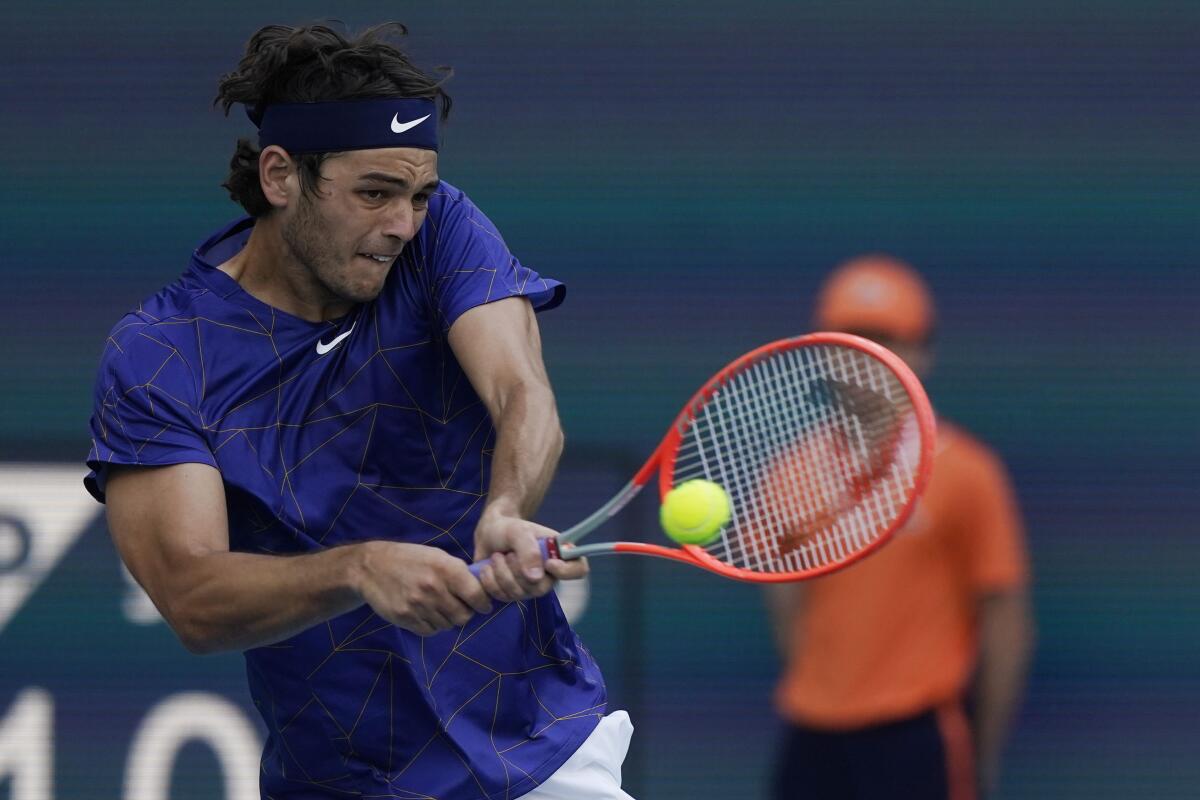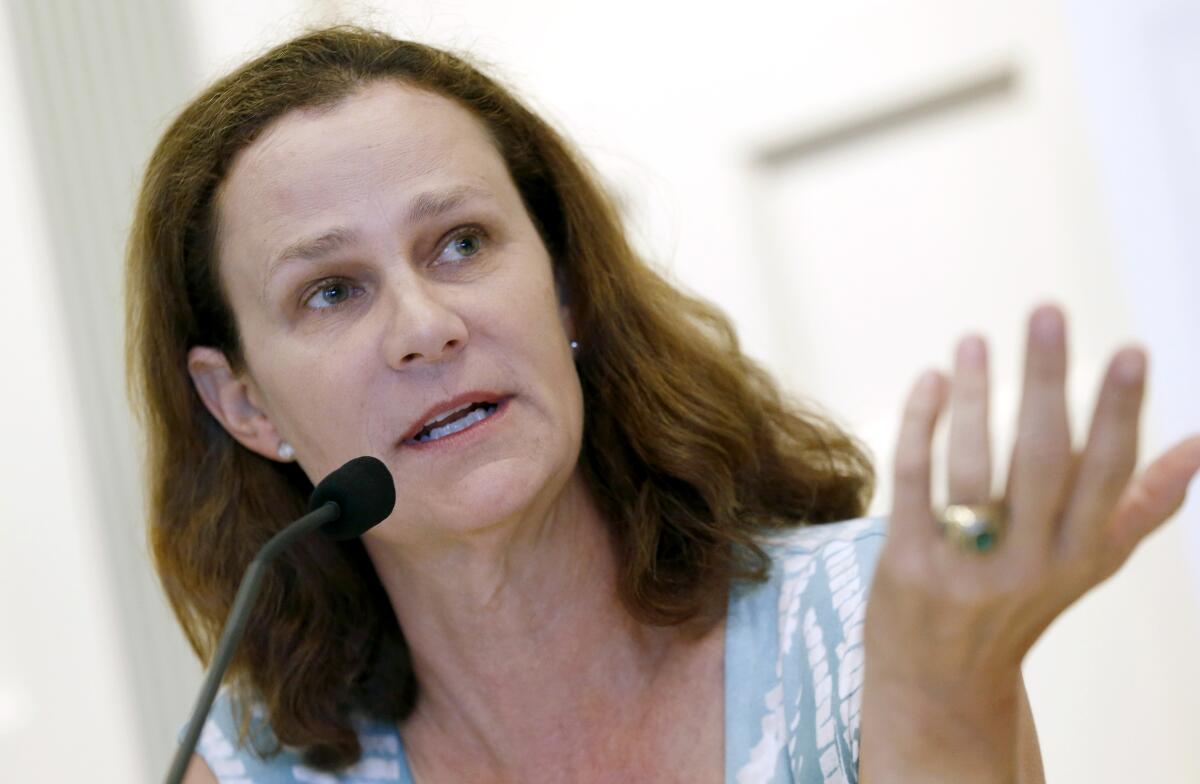Column: SoCal Pro Circuit aims to revive Southern California’s rich tennis legacy

The path to international tennis stardom — the first steps toward conquering the distinctive red clay of the French Open, the hallowed grass at Wimbledon and the craziness of the U.S. Open — inevitably begins at small tournaments played in front of family and friends. For junior and college players in Southern California, that path started in futures events overseen by the International Tennis Federation.
The prize money isn’t big, usually $15,000 or $25,000, but getting ranking points and experience without traveling to Europe are the real rewards for players preparing for the difficult transition to the men’s and women’s pro tours. As recently as a decade ago, the ITF annually staged about a dozen events here at those levels.
“Last year we had one,” said Chris Boyer of Pasadena, a board member of U.S. Tennis Assn. Southern California.
UCLA softball pitcher Megan Faraimo used the message in Kobe Bryant’s ‘The Mamba Mentality’ to bounce back and lead the Bruins to the super regionals.
COVID-19 added another hurtful blow to the perfect storm of economic misfortune that had killed historic tournaments at Manhattan Beach, Carlsbad and UCLA. In addition, Oracle’s termination of its extensive sponsorship of Challenger and Pro Series events cut more than 25 competitions at various levels. The USTA, hit hard in the wallet after COVID restrictions locked fans out of the 2020 U.S. Open, couldn’t continue financing small tournaments. Many were already being run on a shoestring. Those shoestrings snapped.
Southern California, where Serena and Venus Williams, Billie Jean King, Tracy Austin, Lindsay Davenport, Michael Chang, Pete Sampras, Taylor Fritz, Jack Kramer, Pancho Gonzalez, Steve Johnson, the Bryan brothers and other great players nurtured their talents and launched stellar careers, faced an unthinkable challenge to its ability to refine young talent and produce future champions.
Boyer, a marketing company owner and tennis parent, wanted to fill the void left when those events vanished. Working with local business executives, members of the local tennis scene and former players who live here, he headed a committee that secured funding to launch the SoCal Pro Circuit, six tournaments that will feature up-and-coming men’s and women’s players competing at the same site.
The SoCal Pro Circuit will start Monday at Rancho Santa Fe Tennis Club. It will continue at the University of San Diego on June 6, the Barnes Tennis Center in San Diego on June 13, the Jack Kramer Club in Rolling Hills Estates on June 27, Los Caballeros Sports Village in Fountain Valley on July 4, and the Lakewood Tennis Center on July 11. Plans call for 32-draw singles fields and 16-draw doubles fields. Qualifying draws will vary depending on the site and court availability. Admission will be free.
It’s an admirable effort to fix a problem that was a long time in developing and likely will take a long time to solve.
“Southern California is, and always has been, a tennis hotbed,” Boyer said. “I would say that we’re probably the best section in the country in terms of quality and depth of tennis, and historically we’ve always been that way. We want to continue that tradition. We want to continue that growth of tennis here in Southern California and make sure that we continue to have strong players and recognizable players.”
Boyer and Paul Annacone, a former pro who coaches Southern California native Fritz, led an effort that assembled $600,000 in funding from private donors, the Southern California Tennis Foundation and Wilson Sporting Goods. “We went out and rattled the tin cup and did a little dog-and-pony show,” Boyer joked during a telephone interview.
Their act was persuasive, getting them enough backing to commit to running the circuit for three years. That continuity is important to players, and to fans who make emotional investments by following players’ careers.
“That’s super crucial, that we can say, ‘This isn’t one and done,’” said Peter Smith, who coached USC’s men’s team to five NCAA titles and is the director of tennis at the Kramer Club. “I really want to inspire our juniors to watch these guys. We have a college tournament and they got really inspired by that.
“We have to keep going. We have to keep creating players, and that whole process is fun, to watch these kids grow up. You have to give goals and make things inspiring for kids, just to make them go.”

Pam Shriver made some fundraising calls, too. A 22-time Grand Slam doubles champion who’s now a commentator for the Tennis Channel, Shriver grew up in Maryland but is a longtime Southern California resident and SCTA board member. She also saw the importance of bringing back transitional-level pro events here.
“I played at a time on the women’s tour in the late ’70s and ’80s, my developmental years as a pro, I had so many pro tournaments in my country and even in my region if I took the northeast U.S. It’s not there anymore,” she said by phone from Paris, where she’s covering the French Open.
“I think this is a great thing. I think tennis in Southern California has such a rich tradition that the least we can do for the next generation is have a series of developmental, pro-level, point-earning tournaments that can help make their pathway a little easier.”
Annacone sees the new circuit as a good fit with other SCTA initiatives designed to involve families in tennis on a long-term basis, such as camps and educational programs.
“One single thing will not be the cure-all, but the Pro Circuit Series could be a significant part of a new wave of opportunities,” Annacone said. “When you look at options and opportunities, we want to bring people in and make it easy for especially kids to ‘play and stay.’ That concept of retention is key to the growth of the game.”
After losing track and field meets and tennis tournaments that were fixtures here, adding tournaments is a welcome change. Tennis champions can be molded here, and we can watch the process begin.
More to Read
Go beyond the scoreboard
Get the latest on L.A.'s teams in the daily Sports Report newsletter.
You may occasionally receive promotional content from the Los Angeles Times.












